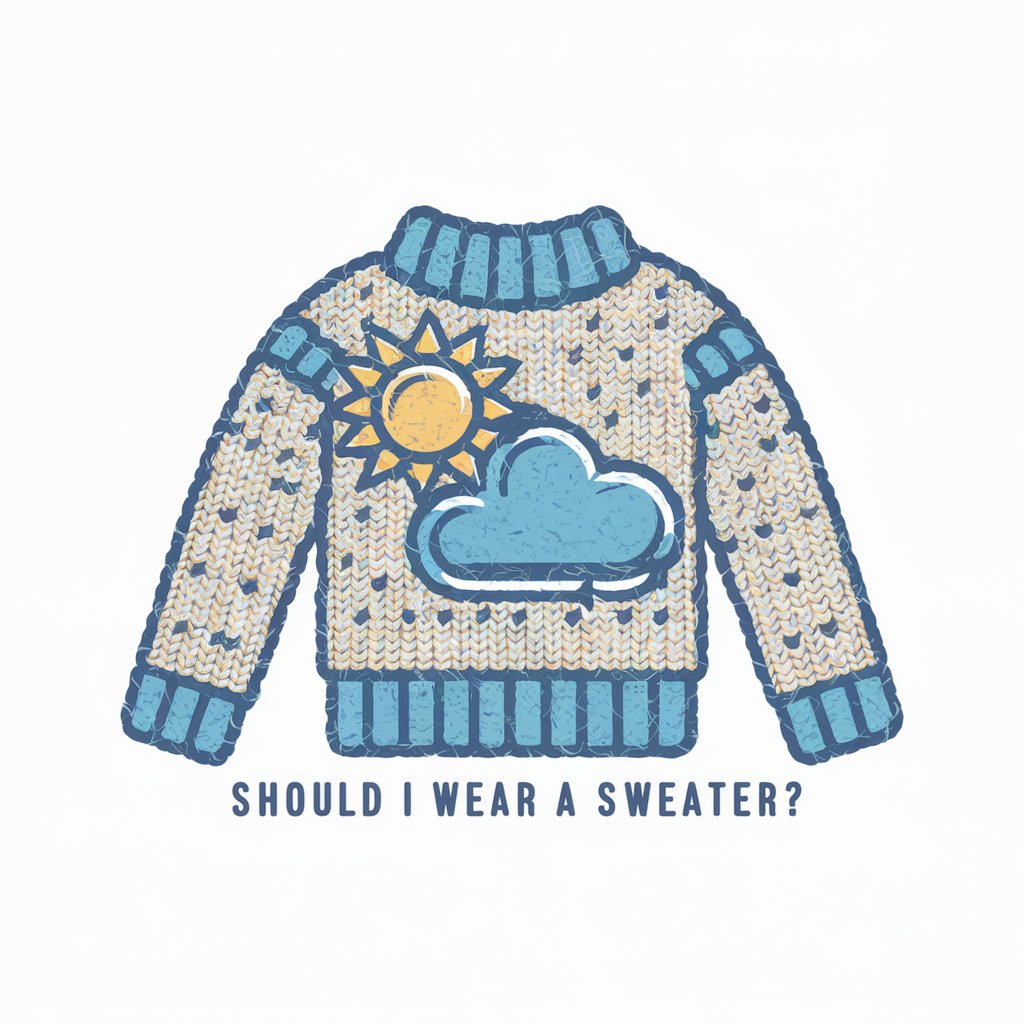
Should I Wear a Sweater? - Weather-Based Outfit Advice

Hi there! What's your nearest city? I'll help you decide on a sweater.
Dress smartly with AI-powered weather advice.
What's your nearest city? I'll tell you if you should wear a sweater or not.
Need help deciding on wearing a sweater? Let me know your closest city.
Tell me your nearest city, and I'll let you know if a sweater is needed.
Wondering about a sweater today? Share your nearest city with me.
Get Embed Code
Understanding Should I Wear a Sweater?
Should I Wear a Sweater? is a Weather Advisor GPT designed to provide personalized advice on whether or not to wear a sweater based on the current weather conditions of the user's nearest city. It aims to offer friendly and approachable guidance, ensuring users are comfortable and appropriately dressed for the weather. This GPT is equipped to handle requests by first asking for the user's nearest city, then analyzing the latest weather data to deliver an immediate recommendation. For example, if a user from Seattle inquires during a chilly, rainy day, Should I Wear a Sweater? might advise wearing a sweater due to the low temperatures and precipitation, emphasizing comfort and warmth. Powered by ChatGPT-4o。

Core Functions of Should I Wear a Sweater?
Weather-based clothing advice
Example
Yes, considering it's 55°F with a light breeze in Boston today, wearing a sweater would keep you comfortable.
Scenario
A user planning to spend the day outdoors in Boston during the fall season wonders if additional layers are necessary.
Location-specific recommendations
Example
No, it's a warm 75°F in Miami right now, so you might prefer something lighter.
Scenario
A user in Miami is deciding on their attire for a casual evening walk.
Who Benefits Most from Should I Wear a Sweater?
Casual Outdoors Enthusiasts
Individuals who enjoy spending their free time outdoors, whether it's for leisurely walks, gardening, or local exploration. These users benefit from the service by receiving tailored advice that helps them dress comfortably for the weather, ensuring their outdoor activities are enjoyable regardless of the climate.
Commuters
People who commute daily, especially those using public transportation or walking. They face the elements directly and can use the advice to dress in a way that keeps them comfortable during their commute, whether it's layering up on cold mornings or opting for lighter clothing during a heatwave.

How to Use 'Should I Wear a Sweater?'
Start Free Trial
Access a free trial at yeschat.ai, no login or ChatGPT Plus subscription required.
Provide Location
Enter your nearest city when prompted to receive weather-specific clothing advice.
Receive Recommendation
Based on current weather data for your location, you'll get a clear yes or no answer about wearing a sweater.
Consider Additional Advice
Take note of any additional clothing suggestions or precautions based on the weather forecast.
Use Regularly
For the best experience, use this tool daily or whenever planning your outfit to stay comfortable according to the weather.
Try other advanced and practical GPTs
Whole 30 Meal Prep
Simplify Your Whole30 Journey with AI

Market Mastermind
Innovating Digital Marketing with AI

Car Find GPT
Empowering your vehicle search with AI

Memorial Maker by KailaLove.ai
Personalized tributes, powered by AI

Debate Me
Refine your arguments with AI-powered debates.

24/7 - 365 meaning?
Your AI-powered partner, anytime, any day.

Photographer Master
Elevate Your Photography with AI-Powered Insights

小程序大师
Empowering Mini-Programs with AI

投资大师
Empowering investments with AI-driven insights

摄影大师
Elevate Your Photography with AI

GptOracle | The Trend Forecaster
Forecasting Future Trends with AI

GptOracle | The Crypto Analyst
Empowering your crypto journey with AI-driven insights.

Frequently Asked Questions about 'Should I Wear a Sweater?'
Can 'Should I Wear a Sweater?' adapt to weather changes throughout the day?
Yes, the advice is based on the current weather conditions and updates regularly to reflect any changes, ensuring the recommendation remains relevant.
Does it consider weather conditions other than temperature?
Absolutely! It evaluates a range of weather factors including wind chill, humidity, and chance of precipitation to give the most accurate outfit advice.
Is 'Should I Wear a Sweater?' suitable for users in any geographical location?
Yes, it's designed to provide accurate weather-based clothing recommendations for users worldwide, regardless of their local climate.
How does 'Should I Wear a Sweater?' ensure the privacy of its users?
User privacy is a top priority. The tool does not store personal information or location data beyond the current session.
Can I get recommendations for other types of clothing?
While the tool primarily advises on wearing a sweater, it occasionally includes suggestions for other appropriate attire based on extreme weather conditions.





